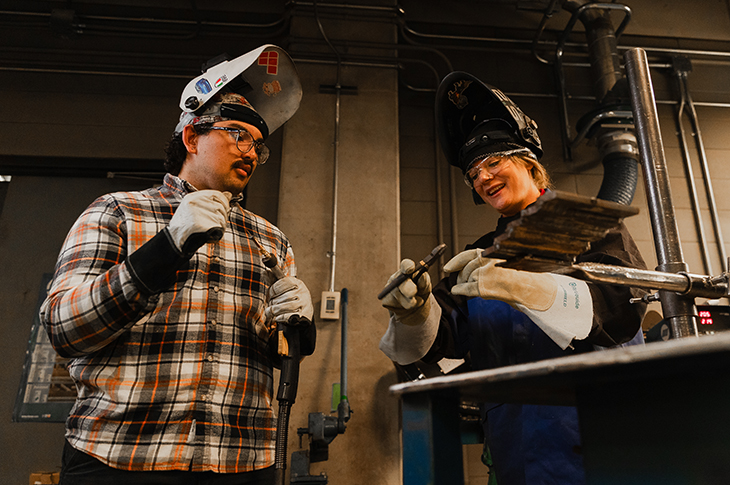Letting every mind shine

Do great minds really think alike? Not necessarily. We all tend to process information, learn new ideas and make decisions in our own unique ways. SAIT strives to create an inclusive, welcoming and accommodating learning environment for every type of person and every type of mind.
Recently, SAIT has seen an increase in the population of students who identify as neurodivergent. The concept of neurodiversity recognizes that conditions like Autism, ADHD, and Dyslexia are examples of variations in information processing and learning, and those with these conditions are considered "neurodivergent."
Thanks to donor support, SAIT has welcomed Neurodiversity Specialist Dani Taylor to the Lamb Learner Support Centre. In addition to developing and implementing student supports, Taylor will provide instructors with the tools and training they need to work with neurodivergent students and ensure SAIT spaces are welcoming to all minds.
“Neurodivergent students bring unique perspectives and approaches that enrich the SAIT community. Supporting these students not only benefits them individually but also enhances the learning environment for everyone.” says SAIT’s Neurodiversity Specialist, Dani Taylor.
A different way of thinking
For second-year Welding Engineering Technology (WET) student Caleb Reed, neurodiversity is just a different way of thinking.
“I have a unique learning style to everyone else, where in certain aspects, I learn quicker than some people, but in other aspects, I learn slower,” he explains. “If you give me a book, I'm going to struggle a lot to take in that information, whereas if it’s hands-on learning I'm overly interested… I see neurodivergence as more of a superpower than something that's holding me back.”
Reed has never seen his neurodiversity as a hindrance to learning—and it shows. He returned to SAIT for WET after completing the Automotive Service Technology program in 2016 and throughout his academic career has received several donor-supported student awards for academic achievements.
“I received the Gene Haas award which was more than I could have imagined,” he reflects. “I have a fascination for machining equipment and a love for Formula 1, so Gene is the guy that fuels my passions … I greatly appreciate each and every donor that supports students like me, because if it wasn’t for them, we wouldn’t be able to succeed.”

Reed considers SAIT’s hands-on approach to education beneficial to someone who learns the way he does.
“SAIT is definitely more designed for people with neurodiversity or learning disabilities in general, in my opinion,” he says.
And while he has been able to pursue his educational ambitions without seeking accommodations or support from SAIT’s Lamb Learner Success Centre, Reed knows that these supports are available for students who need them.
“I’ve always known that SAIT has the option for accommodations. From day one it was obvious that the Lamb Learner Centre was a place I could go,” he shares. “And SAIT is doing a really good job at providing the help that you need. And it goes beyond being neurodivergent; it's financial help, and it's tutoring, and it's almost everything that you need.”
Through funding like the SAIT Opportunities Fund, the Lamb Learner Success Centre ensures equal opportunity for all students, enhances learning environments and promotes mental health and wellbeing.
Find out how you can make a difference at SAIT and help every mind shine at sait.ca/donors/donate-to-sait.

Oki, Âba wathtech, Danit'ada, Tawnshi, Hello.
SAIT is located on the traditional territories of the Niitsitapi (Blackfoot) and the people of Treaty 7 which includes the Siksika, the Piikani, the Kainai, the Tsuut’ina and the Îyârhe Nakoda of Bearspaw, Chiniki and Goodstoney.
We are situated in an area the Blackfoot tribes traditionally called Moh’kinsstis, where the Bow River meets the Elbow River. We now call it the city of Calgary, which is also home to the Métis Nation of Alberta.